The Difference Between Magical Realism, Surrealism, and Slipstream
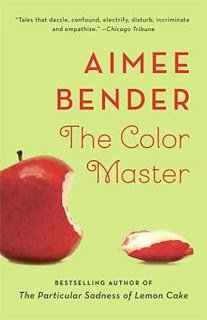 I've been reading Aimee Bender's The Color Master, and it's just fantastic, so I started doing some research on her, and I noticed that some people said she does magical realism and others say she does surrealism and all of a sudden slipstream was in there. So I did what I always do in these circumstances - research spree! Here's what I found:
I've been reading Aimee Bender's The Color Master, and it's just fantastic, so I started doing some research on her, and I noticed that some people said she does magical realism and others say she does surrealism and all of a sudden slipstream was in there. So I did what I always do in these circumstances - research spree! Here's what I found:What is Magical Realism or Magic Realism?Okay, this one I already knew as I work with it in my own fiction. Magical realism or magic realism is a genre of fiction and film that blends magical elements with reality in a way that blurs the edges until seamless. The stories are generally, but not always, characterized by a unique tone and atmosphere of wonder, magic, mystery, or just a sense of strangeness.
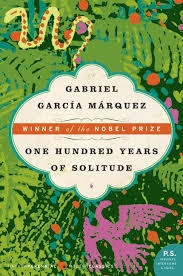 Magical realism originated in Latin-America and is closely tied with Catholicism and religious blending often seen in Latin American culture. According to The Encyclopedia Britannica: “Magic realism, chiefly Latin-American narrative strategy that is characterized by the matter-of-fact inclusion of fantastic or mythical elements into seemingly realistic fiction. Although this strategy is known in the literature of many cultures in many ages, the term magic realism is a relatively recent designation, first applied in the 1940s by Cuban novelist Alejo Carpentier, who recognized this characteristic in much Latin-American literature. . ."
Magical realism originated in Latin-America and is closely tied with Catholicism and religious blending often seen in Latin American culture. According to The Encyclopedia Britannica: “Magic realism, chiefly Latin-American narrative strategy that is characterized by the matter-of-fact inclusion of fantastic or mythical elements into seemingly realistic fiction. Although this strategy is known in the literature of many cultures in many ages, the term magic realism is a relatively recent designation, first applied in the 1940s by Cuban novelist Alejo Carpentier, who recognized this characteristic in much Latin-American literature. . ."Notice it says that these techniques have been around and in many cultures for many centuries but it wasn't really designated into a genre until the 1940s and it was in response to these Latin American authors.
It goes onto say: "Prominent among the Latin-American magic realists are the Colombian Gabriel García Márquez, the Brazilian Jorge Amado, the Argentines Jorge Luis Borges and Julio Cortazar, and the Chilean Isabel Allende.”
For a really in-depth look at magical realism, check out my posts Everything You Want to Know About Magical Realism, Popular Magical Realism Books & Films and Tips and Tricks for Writing Magical Realism.
What is Surrealism in Fiction i.e. Surrealist Literature?
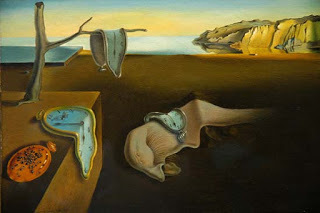 The Persistence of Memory, oil on canvas, by Salvador Dalí, …According to the Encyclopedia Britannica entry on Surrealism, the movement came out of the period between World War I and World War II and was an expression of frustration with the way rationalism had destroyed the world. Thus these artists' and authors' creations destroyed reason with fantastical and nonsensical imagery and ideas.
The Persistence of Memory, oil on canvas, by Salvador Dalí, …According to the Encyclopedia Britannica entry on Surrealism, the movement came out of the period between World War I and World War II and was an expression of frustration with the way rationalism had destroyed the world. Thus these artists' and authors' creations destroyed reason with fantastical and nonsensical imagery and ideas. According to What is Surrealism in Literature, the poet Andre Breton founded and propelled the genre by publishing The Manifesto of Surrealism in 1924, Paris.
Surrealism deals a lot with Freudian theories like free association. Artists and authors try to blend the unconscious mind with the conscious. They use a lot of juxtapositions and contrasting imagery and metaphor. What is Surrealism in Literature also says that surrealism challenges readers to tap into the sub-conscious, think beyond what society has to say, and look inside one's self for answers. It creates fantastical, logic-defying, and dreamlike worlds using poetic styles and techniques instead of traditional linear plotlines.
Check out 10 Essential Surrealist Books for Everyone for some examples.
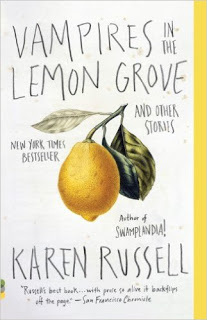 What About Slipstream?Slipstream is another genre that came up in my research. According to Slipstream Goes Mainstream on the Wall Street Journal sci-fi author Bruce Sterling coined the term in 1989 to describe fiction that "slips" in and out of a variety of genres, most commonly sci-fi, fantasy, and horror, creating work that "makes you feel strange."
What About Slipstream?Slipstream is another genre that came up in my research. According to Slipstream Goes Mainstream on the Wall Street Journal sci-fi author Bruce Sterling coined the term in 1989 to describe fiction that "slips" in and out of a variety of genres, most commonly sci-fi, fantasy, and horror, creating work that "makes you feel strange."The article refers to many authors that are also known for their magical realism or surrealism, including Kelly Link, Aimee Bender, and Karen Russell. However in a USA Today interview with Karen Russell, the author says she's not sure if the term magical realism works for her writings, and that she finds it difficult to put any label on her work.
For more on this, the article Oh Slippery Slipstream has a much more in-depth analysis of the origins of the term in late 1980s sci-fi community that is quite interesting.
Check out The Guardian's Top 10 Slipstream Books, the Best of Slipstream Stories, or Slipstream Resources for some examples.
What's the Difference Between Magical Realism, Surrealism, and Slipstream?
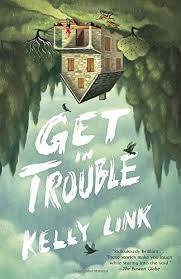 Obviously, each genre/technique has a different origin story and thus different characteristics. Magical Realism comes out of Latin American countries where natives cultures blended their old belief systems with Catholicism over time. This led to a culture where the idea that magic can blend with reality is really not a strange idea at all.
Obviously, each genre/technique has a different origin story and thus different characteristics. Magical Realism comes out of Latin American countries where natives cultures blended their old belief systems with Catholicism over time. This led to a culture where the idea that magic can blend with reality is really not a strange idea at all. Magical Realism also maintains a sense of reality while Surrealism and Slipstream destroy it. It seems like there is a general feeling that magical realism is also lighter in nature. The interviewer in the USA Today interview with Karen Russell said Russell's work seemed like it dealt too much with death to be considered magical realism. As someone who writes darker magical realism, I'm not sure if I agree with this, but it's something to consider.
Surrealism, like slipstream, defies logic, but it does it in a very specific way, by using contradictory imagery and ideas in an effort to spark something within the reader's or author's subconscious mind. In an interview with Aimee Bender on Distortion comes From the Truth, Bender says that both magical realism and surrealism apply to her work, but that surrealism is dealing more with juxtapositions and moving away from what makes sense. It also moves away from using traditional plotlines and timelines, which is something Bender is known for.
Now slipstream, also defies logic and reason, but seems to go even further, not having the specific constraints of surrealism. It was born out of the need for a word to describe a type of fiction that didn't quite fit into the sci-fi genre or any other genre because it borrowed from so many. The only thing that seems to link slipstream works together is that they are all very fantastical and defying logic.
It's kind of hard to determine the difference between these genres mainly because when you seek out an example, you find books that are considered as being all three of these genres, and I'm no expert. Keep in mind that this is what I've concluded are the differences based on this research. I think to really find out for sure, we are all going to have to run and read some of these examples.
What do you know about these genres? What can your research or experience tell us?
Published on July 18, 2016 11:31
No comments have been added yet.
Become a VIP Reader Today!
Sign Up Now!
1. Be the First to Know About Free-bees, Giveaways, and Discounts in addition to receiving Email List Only Deals and Prizes!
2. Read Behind the Scenes Material from Published & In-Progress Sign Up Now!
1. Be the First to Know About Free-bees, Giveaways, and Discounts in addition to receiving Email List Only Deals and Prizes!
2. Read Behind the Scenes Material from Published & In-Progress Books and Provide Feedback!
3. Get the Chance to Become a Test Reader and Receive an Advanced Copy for Free!
4. Be the First to Know About New Releases!
5. Learn more about me and my books, while also learning the how-tos of writing and publishing through my experiences.
Sign Up Now!
Email Address
...more
1. Be the First to Know About Free-bees, Giveaways, and Discounts in addition to receiving Email List Only Deals and Prizes!
2. Read Behind the Scenes Material from Published & In-Progress Sign Up Now!
1. Be the First to Know About Free-bees, Giveaways, and Discounts in addition to receiving Email List Only Deals and Prizes!
2. Read Behind the Scenes Material from Published & In-Progress Books and Provide Feedback!
3. Get the Chance to Become a Test Reader and Receive an Advanced Copy for Free!
4. Be the First to Know About New Releases!
5. Learn more about me and my books, while also learning the how-tos of writing and publishing through my experiences.
Sign Up Now!
Email Address
...more
- Stephanie Carroll's profile
- 30 followers



